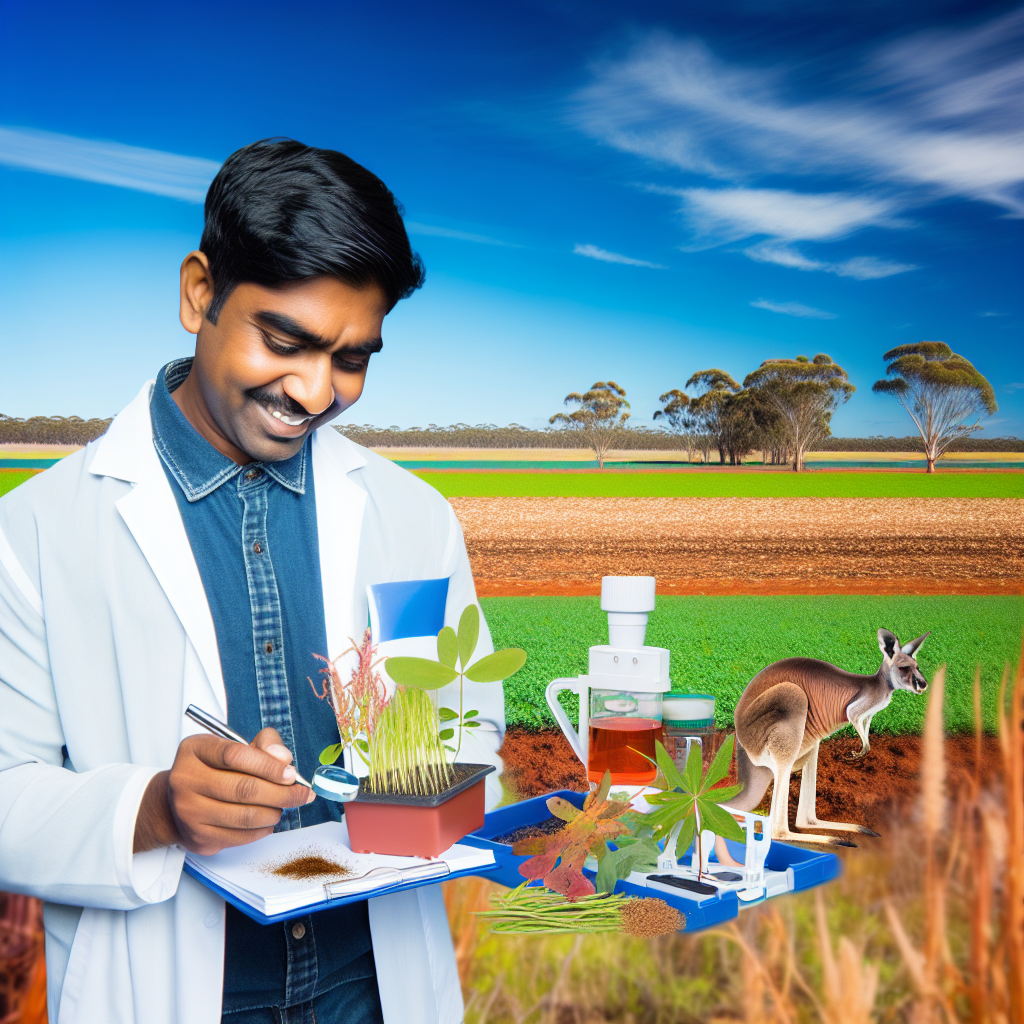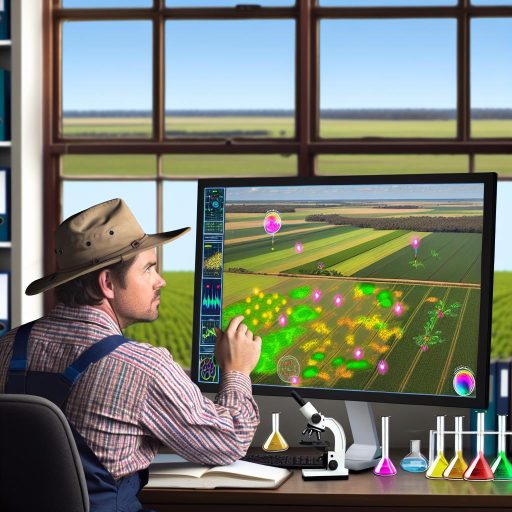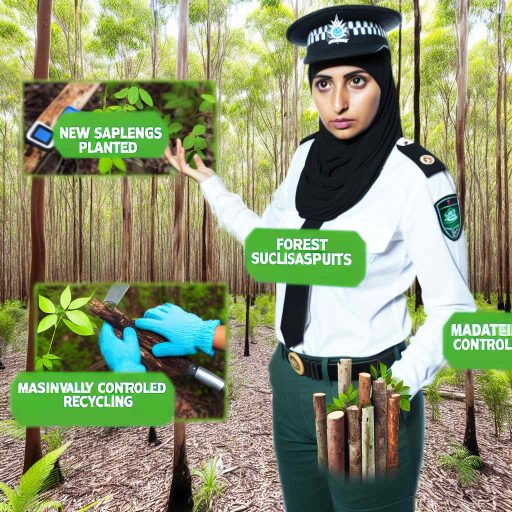Understanding the Role of Agronomists in Agriculture
Defining Agronomy
Agronomy is the science of soil management and crop production.
Agronomists apply their knowledge to enhance agricultural practices.
They focus on increasing crop yield and ensuring food security.
Key Responsibilities of Agronomists
Agronomists conduct research to develop better farming techniques.
They assess soil health and recommend appropriate amendments.
Additionally, they provide advice on pest and weed management.
Agronomists also collaborate with farmers to implement sustainable practices.
The Impact on Crop Yields
Agronomists play a vital role in improving crop yields.
They introduce new varieties of crops that are high-yielding.
By optimizing planting techniques, agronomists enhance productivity.
Furthermore, they help farmers adapt to changing climate conditions.
Collaboration with Farmers
Agronomists work closely with farmers to understand their needs.
They provide training on best agricultural practices.
This collaboration leads to greater adoption of innovative techniques.
Ultimately, it fosters a more resilient agricultural sector.
Your Personalized Career Strategy
Unlock your potential with tailored career consulting. Get clear, actionable steps designed for your success. Start now!
Get StartedFuture Challenges and Opportunities
The agricultural industry faces numerous challenges ahead.
Climate change poses significant threats to crop production.
Agronomists must adapt their strategies to mitigate these impacts.
Additionally, they will explore new technologies to enhance efficiency.
Collaboration across sectors will be key to overcoming these challenges.
The Science Behind Crop Yields: Why Agronomy Matters
Understanding Agronomy
Agronomy is the science of soil management and crop production.
It integrates various scientific disciplines to optimize agricultural practices.
Agronomists focus on improving crop yields through research and development.
They study plant genetics, soil fertility, and pest management techniques.
The Role of Agronomists
Agronomists play a pivotal role in modern farming.
They provide essential advice to farmers on maximizing yields.
Moreover, they develop sustainable practices to ensure soil health.
Through field trials, agronomists identify best practices for crop production.
They also analyze climatic conditions to predict crop performance.
Stand Out with a Resume That Gets Results
Your career is worth more than a generic template. Let us craft a resume and cover letter that showcase your unique strengths and help you secure that dream job.
Get HiredBenefits of Agronomy in Crop Yields
Implementing agronomic practices leads to higher crop productivity.
Farmers benefit from these practices in several ways:
- Improved soil health increases nutrient availability.
- Effective pest management minimizes crop loss.
- Crop rotation enhances biodiversity and reduces disease risks.
- Data-driven decisions optimize resource use, lowering costs.
The Impact of Technology
Technology significantly enhances agronomy practices.
Precision agriculture utilizes data to maximize farm efficiency.
Modern tools help agronomists monitor crops and soil conditions closely.
Drones and sensors collect invaluable data in real time.
These innovations lead to timely interventions and informed decisions.
Future of Agronomy
The future of agronomy hinges on continuous research and innovation.
Agronomists must address challenges such as climate change and population growth.
Research in sustainable practices will be critical moving forward.
Collaboration among scientists and farmers will enhance crop yield strategies.
As global food demand rises, agronomy will become increasingly vital.
Case Studies: Success Stories of Agronomists Enhancing Yields
Innovative Practices at Green Harvest Farms
Agronomists at Green Harvest Farms implemented precision agriculture in corn production.
This practice significantly increased yield by using data-driven approaches.
Transform Your LinkedIn for Maximum Impact
Elevate your professional brand with a LinkedIn profile that attracts recruiters, showcases your expertise, and maximizes opportunities. Stand out in your industry with a profile built for success.
Boost ProfileThrough soil analysis, they identified key nutrient deficiencies.
As a result, they customized fertilization plans for different fields.
Furthermore, they monitored crop health using drone technology.
This innovation allowed for timely interventions against pests.
Ultimately, Green Harvest Farms experienced a 25% increase in corn yield.
Sustainable Solutions at Eco Growers Coop
Eco Growers Coop adopted organic farming methods to enhance tomato yields.
Agronomists introduced cover cropping to improve soil fertility.
This method reduced the need for chemical fertilizers.
Moreover, they utilized integrated pest management techniques.
This strategy minimized crop losses due to pests.
Through these practices, Eco Growers Coop achieved a 30% increase in tomato production.
High-Tech Strategies at AgriTech Innovations
AgriTech Innovations employed cutting-edge technology for wheat farming.
The team of agronomists used satellite imagery to assess crop conditions.
This allowed for precise irrigation management based on moisture levels.
Additionally, they developed tailored seed varieties for local climates.
These strategies led to a remarkable 20% yield increase in wheat crops.
Collaborative Research with Local Universities
A partnership between local universities and agronomists yielded impressive results.
Research focused on developing pest-resistant crop varieties.
As a result, farmers reported a significant reduction in pesticide use.
This collaboration not only improved yields but also promoted sustainability.
The participating farms increased their overall productivity by 15%.
Learn More: Tech-Driven Farming: How Careers in Australian Agriculture are Evolving
The Impact of Soil Health on Crop Production and Agronomist Strategies
Understanding Soil Health
Soy health significantly influences crop production.
Healthy soil supports better root growth.
This leads to improved nutrient uptake.
Moreover, healthy soil enhances water retention.
Additionally, soil biodiversity contributes to overall vitality.
Agronomist Roles in Assessing Soil Quality
Agronomists play a crucial role in evaluating soil health.
They conduct soil tests to analyze nutrient levels.
Furthermore, they assess soil structure and composition.
These evaluations identify potential issues affecting yields.
Based on results, agronomists recommend necessary amendments.
Strategies for Improving Soil Health
Agronomists implement various strategies to enhance soil health.
- Crop rotation promotes diversity and resilience.
- Cover cropping minimizes erosion and improves organic matter.
- No-till practices maintain soil structure and moisture.
These methods encourage a sustainable approach to agriculture.
Monitoring and Adapting Strategies
Agronomists continuously monitor soil conditions.
Regular assessments help adapt crop management practices.
Data-driven decisions lead to higher crop yields.
Additionally, ongoing research supports innovative techniques.
This proactive approach ensures long-term agricultural sustainability.
Learn More: Careers in Sustainable Farming in Australia: Navigating the Future of Agriculture
Integrating Technology and Innovation in Agronomy for Higher Yields
Embracing Precision Agriculture
Precision agriculture revolutionizes traditional farming practices.
This technology utilizes data analytics to make informed decisions.
Farmers can monitor crop health and soil conditions easily.
Consequently, they can optimize inputs like fertilizers and water.
This leads to enhanced crop yields and reduced waste.
Utilizing Data-Driven Insights
Data-driven insights empower agronomists to make strategic recommendations.
Tools like sensors and satellite imagery provide real-time information.
This data helps in diagnosing problems early and accurately.
Furthermore, it allows for tailored interventions to boost productivity.
Innovative Practices and Sustainability
New farming practices promote sustainability without sacrificing yields.
Cover cropping is one such method that enhances soil health.
Moreover, crop rotation diversifies production and reduces pests.
These practices improve resilience against climate change impacts.
Collaboration and Knowledge Sharing
Collaboration between researchers and farmers is essential.
Agro-tech companies facilitate knowledge sharing and training.
This ensures that innovative solutions reach the farming community.
As a result, farmers can apply the latest advancements in agronomy.
Tools for Enhancing Yields
Technology continues to provide tools for higher yields.
Drone technology assists in monitoring vast agricultural areas.
These aerial assessments highlight issues and improvement areas.
Additionally, automated machinery improves efficiency in operations.
Gain More Insights: Top Aussie Agriculture Jobs: In-Demand Roles in 2024

Sustainable Practices in Agronomy: Balancing Yield and Environmental Health
Overview of Sustainable Agronomy
Sustainable agronomy focuses on achieving high crop yields responsibly.
This approach prioritizes environmental health along with production efficiency.
It integrates scientific knowledge with traditional farming wisdom.
Key Sustainable Practices
- Crop rotation enhances soil fertility and disrupts pest cycles.
- Cover crops reduce soil erosion and improve organic matter levels.
- Integrated pest management minimizes chemical usage effectively.
- No-till farming preserves soil structure and health.
Impact on Crop Yields
Employing sustainable practices often leads to increased crop resilience.
Healthy soils contribute to better nutrient uptake by plants.
Consequently, these methods can yield higher productivity over time.
Environmental Benefits
Sustainable farming reduces the environmental footprint of agriculture.
It enhances biodiversity by promoting a variety of crops.
Additionally, it helps in conserving water through efficient use.
Challenges and Solutions
Farmers face challenges while transitioning to sustainable practices.
Education and access to resources are crucial for overcoming these hurdles.
Collaborative efforts among agronomists, farmers, and policymakers can drive change.
Future of Sustainable Agriculture
The future of agriculture lies in sustainable practices.
With continued research, agronomists will develop innovative solutions.
This progress will ensure food security while safeguarding the environment.
See Related Content: Australia’s Mining Engineers: Education Pathways
Challenges Faced by Agronomists
Weather Variability
Weather patterns are increasingly unpredictable in modern agriculture.
Agronomists rely heavily on accurate weather forecasts.
Extreme weather events can damage crops and reduce yields.
Inconsistent rainfall can lead to drought or flooding.
Ultimately, weather variability directly impacts harvest quality.
Pest Management
Pest infestations pose a significant challenge to crop yields.
Agronomists develop integrated pest management strategies.
They combine biological, physical, and chemical controls effectively.
Resistant crop varieties help mitigate pest damage.
Moreover, timely interventions can protect vulnerable crops.
Resource Limitations
Limited access to resources hinders effective agronomy practices.
Agronomists often compete for water, land, and fertilizers.
Additionally, sustainable practices require adequate funding and support.
Soil health can diminish due to overuse of chemical inputs.
Furthermore, agronomists advocate for resource conservation methods.
Technological Challenges
Technology adoption is crucial for modern agronomy.
However, not all farmers have access to the latest tools.
Agronomists work to bridge the technology gap between regions.
Training and education are vital for effective technology use.
Effective communication can enhance understanding of new methods.
Market Fluctuations
Market conditions can greatly impact crop decisions.
Price volatility creates uncertainty for farmers and agronomists.
Agronomists provide insight into market trends and risks.
They help farmers adapt strategies based on market demands.
Additionally, building strong market relationships is essential.
Future Trends in Agronomy: The Role of Agronomists in Climate Resilience
Understanding Climate Resilience
Climate resilience refers to the capacity of agriculture to adapt to changing climate conditions.
Agronomists play a crucial role in enhancing this adaptability.
They conduct research to understand the impacts of climate change on crops.
This understanding helps in developing strategies for sustainable crop management.
Innovative Techniques in Agronomy
Agronomists are adopting innovative techniques to improve crop resilience.
Precision agriculture is one such technique that utilizes technology for better outcomes.
By employing data analytics, they can predict and respond to climate variations promptly.
Furthermore, they use climate-resilient crop varieties to ensure better yields.
Collaboration with Farmers
Agronomists work closely with farmers to implement resilience strategies.
They provide training on best agricultural practices tailored to local conditions.
This collaboration ensures that farmers can adapt quickly to climate challenges.
Additionally, agronomists share valuable information on soil health and crop rotations.
Future Directions in Agronomy
The future of agronomy hinges on ongoing research and collaboration.
As climate patterns continue to evolve, so must the strategies employed by agronomists.
Emerging technologies like artificial intelligence will enhance predictive models.
This advancement will lead to more informed decisions in crop management.
The Role of Education and Outreach
Education is key to effective climate resilience in agriculture.
Agronomists are tasked with educating both farmers and the public about these issues.
Outreach programs help disseminate vital information on sustainable practices.
Ultimately, informed communities are better equipped to face climate challenges.




